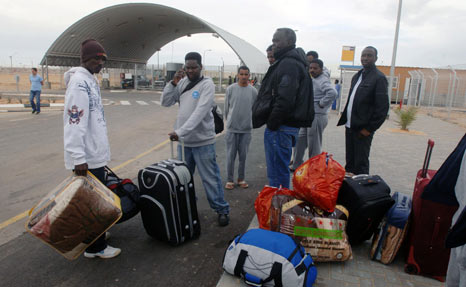High Time for a Fair Israeli Asylum Regime
As World Refugee Day approaches, Dr. Ruvi Ziegler argues that it is high time for Israel to adopt a fair asylum policy that would mitigate the predicament of Eritrean and Sudanese nationals.

20th June marks World Refugee Day, proclaimed by UN General Assembly Resolution 55/76 of 4 December 2000 to commemorate the convening of the Convention of Plenipotentiaries that has led to the adoption of the 1951 Convention Relating to the Status of Refugees. Last year, UNHCR reported that the number of refugees, asylum-seekers and internally displaced people worldwide has, for the first time in the post Second World era, exceeded 50 million people. According to figures published on 18 June 2015, the number is now 59.5 Million. The massive increase in recent tears was driven mainly by the conflict in Syria: more than half of the state’s population has been internally or externally displaced. Outside Syria, the lion’s share of refugees reside in Syria’s neighbouring states (save Israel), hosting between then close to 4 million refugees (1.8 million in Turkey, 1.2 million in Lebanon, 600,000 in Jordan, 250,000 in Iraq). Indeed, 86 per cent of refugees globally reside in the developing world. Recently, the plight of refugees has received greater attention as a result of the harrowing scenes of persons (primarily Syrians, Eritreans, and Somalis) drowning in the Mediterranean, and of the Rohingya fleeing from Myanmar. The EU’s initial response to the crisis on its shores has been harshly critiqued (e.g. by Costello and Giuffre); a European Commission proposal for setting a refugee resettlement quota for each EU member state faces considerable political resistance.
Against this background, it is worthwhile shedding light of the dire state of the Israeli asylum system and the predicament that ensues for asylum seekers. I have previously discussed this topic in this form (see e.g. Detention of Asylum Seekers in Israel: Welcome to Round Three and links provided there) and have offered comprehensive analysis thereof in a recently published article (2015) 29(2) Journal of Immigration, Asylum and Nationality Law 172).
Eritreans and Sudanese nationals constitute 92 percent of the 45,711 ‘infiltrators’ residing in Israel (April 2015, official data). Their livelihood is curtailed through hostility, sanctions, and detention, whilst at present Israel refrains from deporting them to their respective countries of origin, recognising that such forced removal could expose them to risks to their lives and/or freedom. Having crossed the Israeli-Egyptian border without authorisation and not through an official border crossing, Israeli law defines such individuals as ‘infiltrators’, a charged term which dates back to border-crossings into Israel by Palestinian Fedayeen in the 1950s. Whilst Israel was the 10th state to ratify the 1951 Refugee Convention, and has acceded to its 1967 Protocol which removed the 1951 Convention’s temporal and geographic restrictions, yet it has not incorporated these treaties into its domestic law not has it enacted primary legislation that sets eligibility criteria for ‘refugee’ status and regulates the treatment of asylum-seekers. Israeli law also fails to accord subsidiary protection status to persons that the state considers to be non-removable, whether or not they satisfy the definition of a ‘refugee’ under the 1951 Convention. Absent legal recognition of ‘refugee’, ‘asylum-seeker’, and ‘beneficiary of subsidiary protection’ statuses, Eritreans and Sudanese nationals are left in legal limbo for an indefinite period qua irregular non-removable persons.
On 4th June 2015, the UN Human Rights Council Commission of Inquiry submitted a damning report concerning the scope and breadth of human rights violations in Eritrea. The report notes that, despite its modest size, Eritrea is the fifth largest producer of asylum seekers: an estimated 5,000 people leaving Eritrea each month. Sudanese nationals, especially Darfuris, form the second largest group of asylum seekers in Israel. Earlier this week, the Sudanese president, Omar Al-Bashir, fled South Africa fearing execution of an arrest warrant issued by the International Criminal Court concerning his alleged involvement in Genocide and Crimes again Humanity. Responding to a petition by Mutasim Ali, a Drafuri asylum seeker whose application is pending over two years, the state informed the court that it has not yet devised a general policy regarding asylum applications submitted by Darfuri nationals.
The commitment to refugee protection, manifested by world refugee day, is global; yet its implementation depends on the actions of individual states, most pertinently regarding persons in need of international protection who are in their territory and subject to their jurisdiction; it is high time for Israel to adopt a fair asylum policy that would mitigate the predicament of Eritrean and Sudanese nationals.
Dr. Reuven (Ruvi) Ziegler explores questions of immigration, asylum, and citizenship as part of IDI's Democratic Principles project. He is a Lecturer in Law at the University of Reading.
